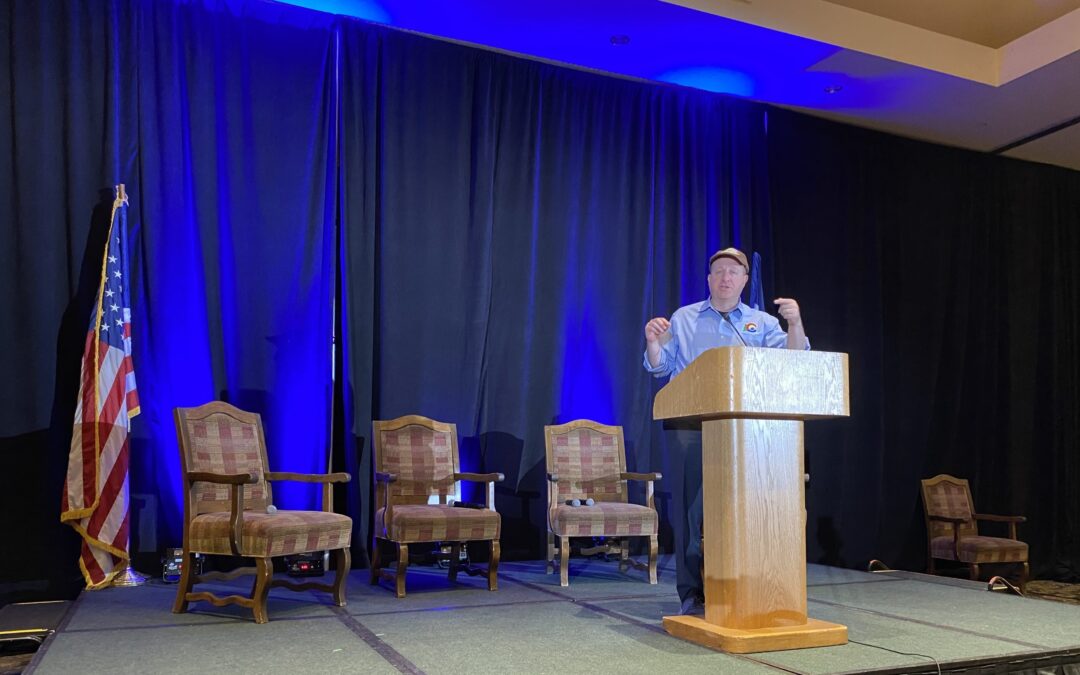STEAMBOAT SPRINGS — Colorado politicos told hundreds of water users Tuesday that they would fight to bring millions of federal water dollars back to the state, offered strong endorsements for a historical water rights purchase on the Colorado River, and said the time is likely not right to start new reservoirs in the state.
The comments of Democrats Gov. Jared Polis, U.S. Sens. John Hickenlooper and Michael Bennet, as well as U.S. Rep. Joe Neguse, who represents the Colorado congressional district that contains the headwaters of the Colorado River, came during a far-ranging discussion that kicked off the annual Colorado Water Congress Summer Conference in Steamboat Springs. The congress is a nonpartisan policy and lobbying group that represents water users across the state. Some 520 people were in the crowd, conference organizers said.
Republican members of the congressional delegation, including Rep. Jeff Hurd, whose district takes in the Western Slope, also were invited to participate but had other commitments, according to conference organizers.
Polis led the afternoon, and said he would continue the bipartisan effort to bring back $140 million in federal money frozen in Washington, D.C., that was planned to help Western states cope with relentless drought in the Colorado River Basin.
“The timing couldn’t be worse when states are facing unrelenting hot and dry weather,” Polis said. He credited the state’s Republican and Democratic representatives with a new pressure campaign to bring the money back and said he is scheduled to meet with the U.S. Secretary of the Interior soon to hopefully secure the release of the funds.
Federal money to help finance a $99 million purchase of a historic set of Colorado River water rights near Glenwood Springs, known as the Shoshone water rights, also took center stage for a time at the conference, with Polis and Hickenlooper calling for the deal to go through. Some $40 million in federal funding for the deal has been frozen, though the state, the Colorado River District, and several Western Slope communities have pledged millions to purchase the water from Xcel Energy.
If the sale goes through, it would be the largest environmental water right in the state, and would keep millions of gallons of water in Western Slope streams. In addition to federal issues, the proposed sale is facing opposition from major Front Range water agencies, including Denver Water and Northern Water, who fear the change could harm their Colorado River water rights.
“I have been an unequivocal supporter of preserving those rights,” Polis said. “This is a once-in-a-lifetime opportunity … We will do everything we can to get this across the finish line.”
As Colorado water utilities push to get major new storage projects, such as the Northern Integrated Supply Project, completed, the prospect of other new reservoirs got little support. When asked, the congressional delegation said they didn’t believe focusing time and effort on building new reservoirs to store more water in the face of drought was a good idea, at least not now.
“In a rare wet year, maybe it makes sense to build some additional storage, but the real effect is going to be in reinforcing and strengthening the existing infrastructure we have in Colorado,” Bennet said. Neguse and Hickenlooper agreed.
And as tense negotiations on how to manage the seven-state Colorado River Basin continue, Hickenlooper strongly urged Colorado negotiators to find agreement with the other states and get a deal done. The states have tentatively agreed on relying more on what the river actually supplies each year, rather than stored water in lakes Powell and Mead, but other major issues remain. If the states can’t agree, the U.S. Supreme Court could be asked to weigh in.
“I encourage our negotiators to hear clearly what the other negotiators are saying and if there is compromise, find it,” Hickenlooper said. “We have too much at risk.”



 Print
Print